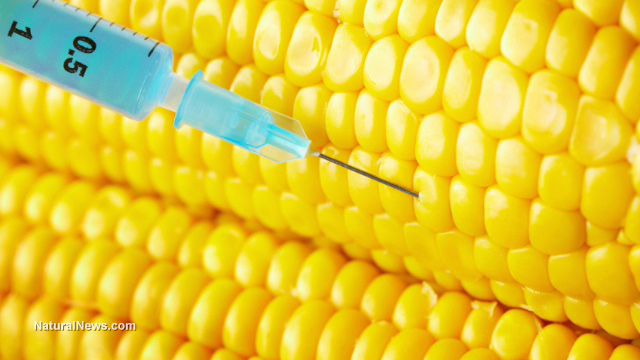China refuses to permit GM rice and corn to be grown by research groups
Wednesday, September 03, 2014 by: J. D. Heyes
Tags: GMO rice, GM corn, China

- Newly released JFK files reveal Pentagon's role in creating Lyme disease and covid in the same lab
- Trump nominates VACCINE ZEALOT Susan Monarez to lead the CDC, sidelining RFK Jr.'s reform efforts
- BEWARE: USDA allows genetically engineered vaccines to infiltrate organic food production
- Obama accused of laundering USAID funds to fuel global protest movements, regime change operations
- Festive flavors: The sweet history, nutritional profile and health benefits of pecan pie
- Dr. Mike Yeadon releases 15-minute testimony - WATCH - about genocidal intent of COVID “vaccines”
- Analysis: The coming economic collapse, a mass uprising and Trump's three secret weapons to halt the growing revolt
- Big Pharma's media takeover: How drug companies bought the news - and your health
- Elon Musk: Aliens could be here on Earth RIGHT NOW
- Trump reverses course on Gaza plan, says “nobody is expelling Palestinians”
- Survival 101: Effective EMF blocking techniques
- Reclaim your health: How midlife exercise reverses years of inactivity
- Big Pharma's $8 Billion bribery scheme exposed: how doctors are pushed to prescribe junk science, not heal
- Rep. Nancy Mace introduces bill to ban biological males from female facilities on federal property
- California's social media censorship law struck down: A victory for free speech or a threat to online safety?
- HUGE: Putin claims 2020 election fraud in U.S. sparked Ukraine war, calls for peace talks with Trump
- RFK Jr.'s SSRI antidepressant investigation sparks liberal meltdown, exposes Big Pharma's dangerous game
- Chris Rufo finally reveals abuse liberals unleashed on his wife and young kids...
- Elon Musk: Aliens could be here on Earth RIGHT NOW
- EPA advisor admits the agency is funneling billions to climate groups ahead of Trump’s return to White House
- Trump reverses course on Gaza plan, says “nobody is expelling Palestinians”
- Reclaim your health: How midlife exercise reverses years of inactivity
- A lack of integrity in Academia: Harvard professor found GUILTY of fraudulent research to promote CRT theory
- Space war brewing? Russia threatens to destroy Starlink satellites
- Big Pharma's $8 Billion bribery scheme exposed: how doctors are pushed to prescribe junk science, not heal
- Mike Adams Sermon 66: God will DESTROY ISRAEL for its wickedness
- Rep. Nancy Mace introduces bill to ban biological males from female facilities on federal property
- Survival 101: Effective EMF blocking techniques
- 5 Simple steps to boost your brainpower: How to strengthen executive function in a distracted world
- Historian warns Israel may be entering an “IRREMEDIABLE DECLINE”
- Florida takes a stand: DeSantis proposes permanent ban on mRNA vaccine mandates
- RFK Jr.'s SSRI antidepressant investigation sparks liberal meltdown, exposes Big Pharma's dangerous game
- New York politicians push bill allowing governor to indefinitely detain the unvaccinated on a whim
- Sales of survival bunkers rise following Russia’s use of the Oreshnik hypersonic ballistic missile
- Pilots report mysterious lights 'moving at extreme speeds' across Oregon skies
- Newly released JFK files reveal Pentagon's role in creating Lyme disease and covid in the same lab
- EPA advisor admits the agency is funneling billions to climate groups ahead of Trump’s return to White House
- The Health Ranger releases “Vaccine Zombie” song and music video, using AI-animated zombies for the music video
- The pandemic as a tool for INDOCTRINATION: Understanding “The Indoctrinated Brain” by Dr. Michael Nehls
- California's social media censorship law struck down: A victory for free speech or a threat to online safety?
- Dr. Mike Yeadon releases 15-minute testimony - WATCH - about genocidal intent of COVID “vaccines”
- Congratulations to the FULLY UNVACCINATED as you resisted the COVID-19 PROPAGANDA MACHINE fueled by over $100 BILLION
- Mike Adams releases country western hit single: Goin’ Back in Time is Comin’ Home
- RFK Jr. clears key hurdle: Sen. Susan Collins backs controversial HHS nominee, signaling a new era for health policy
- Mike Adams releases music poetry sensation: A Child of God
- Mike Adams releases new song and music video: Nothing More Disgusting Than a Globalist
- Unpacking the Lies That We’ve Been Fed – new song and music video released by Mike Adams, the Health Ranger
- Trump administration takes on global censorship: A new frontier for free speech advocacy
- Florida takes a stand: DeSantis proposes permanent ban on mRNA vaccine mandates
- “Why we influenced the 2020 elections”: Facebook files reveal the coordinated effort to bury the Hunter Biden laptop story
- Ex-FBI Chief EXPOSES disgraceful government coverups of Oklahoma City Bombing, Kennedy assassinations, 9/11 WTC, and "Terrorism" as plot to destroy Constitution
- Michigan sheriff announces criminal investigation into 2020 election crimes, Dominion Voting Systems
- Israeli soldiers accused of even more torture and abuse in the West Bank
- Federal judge backs Trump's mass firings, clearing path for government downsizing
- Red Cross issues warning to stop blood plasma donations from vaccinated people
- Scientists confirm: GENIUS brain function can be spontaneously unleashed in humans without any apparent cause
- EPA advisor admits the agency is funneling billions to climate groups ahead of Trump’s return to White House
- HYSSOP: What research reveals about the health benefits of this ancient holy herb
- Two containers with completed ballots fall out of truck in Florida
- Fully vaccinated about to see “tsunami” of illness and death, warns virologist
- Today I asked our AI language model “Neo” about which phytonutrients or phytochemicals can block the spike protein related to SARS-CoV-2 … Here is what it answered…
- Global leaders unite to clamp down on “misinformation” with UN-backed Cascais Declaration
- BREAKING: 2025 NDAA authorizes mandatory military draft of WOMEN across America… as Pentagon pursues global NUCLEAR war with both Russia and China at the same time
- Michael Yon warns of a ZIONIST TAKEOVER in Trump’s second administration
- BOMBSHELL: DNA testing kits are a SCAM to develop ethnic-specific bioweapons
- Ozempic and Wegovy weight loss drugs are injectable LIZARD VENOM PEPTIDES that may unleash a devastating wave of organ failure… side effects align with symptoms of SNAKE BITES
- Israeli soldiers accused of even more torture and abuse in the West Bank
- These 13 countries just signed an agreement to engineer a global FAMINE by destroying food supply
- NASA admits that climate change occurs because of changes in Earth’s solar orbit, and NOT because of SUVs and fossil fuels
- RFK Jr. clears key hurdle: Sen. Susan Collins backs controversial HHS nominee, signaling a new era for health policy
- Sermon 30: How Jesus reveals Caesar’s FAKE CURRENCY and FALSE AUTHORITY
- Coriander seeds: Ancient medicine backed by modern science
The Ministry of Agriculture, the issuing authority for such permits, said it would not renew permission for the groups to grow two varieties of GM rice and a single variety of transgenic corn.
The current permits expired August 17, according to a report in Science magazine, which added that the reason for the decision was not clear, but that it nevertheless "raised questions about the future of related research in China."
The agriculture ministry had made a big deal out of approval of the GM rice certificates in August 2009. The permits allowed a group at the Huazhong Agricultural University in Wuhan to grow a pair of varieties of rice that included a gene from the Bacillus thuringiensis (Bt) bacteria, ostensibly for pest resistance.
'Concern about public safety'
At the same time, the ministry okayed the production of a strain of corn developed by the Chinese Academy of Agricultural Sciences' Biotechnology Research Institute in Beijing. Researchers there had changed the GM corn strain so that its kernels contained phytase, an additive used in livestock feed that supposedly boosts phosphorus absorption, to produce larger livestock. Each of the prior certificates were initially valid for five years.As further reported by Science:
Since the certificates were issued, however, public skepticism about the benefits of GM crops has grown in China. Some scientists conducting GM plant research have been attacked when giving public lectures.
There is no consensus as to why the agriculture ministry let the certificates lapse; some environmentalists have said they believe that it was because of worries among the general public about the dangers and hazards of GM crops.
"We believe that loopholes in assessing and monitoring [GM] research, as well as the public concern around safety issues are the most important reasons that the certifications have not been renewed," Wang Jing, a Greenpeace official based in Beijing, wrote in an email to Science.
But others think that agricultural economics are in play and made the biggest impact on the ministry's decision. After years of agricultural expansion, China is getting close to being self-sufficient in the production of conventional rice varieties. As such, the ministry reached a decision to no longer commercialize Bt rice, according to Huang Jikun, director of the Chinese Academy of Sciences' Center for Chinese Agricultural Policy. He told Science magazine that now, with commercialization out of the equation, there was little point in reauthorizing the existing permits. He also said that "rising public concerns [regarding] the safety of GM rice" most likely held some sway over the government's decision.
Whatever the reasons, however, the decision is a major shift away from transgenic rice in China, which had once been seen as promising in the next wave of agricultural development.
China has already ended import of American GMO corn feed
Cao Cong, a China police expert at the University of Nottingham in England, wrote recently in a post on The Conversation, an Australian site, that, five years ago, "China was widely expected to soon put GM rice on the country's dining tables."But since the ministry's decision, the Bt rice project "is now to all intents and purposes dead and buried," he further wrote, attributing the program's demise to an "anti-GM movement whose power and influence are more than matched by its fervour and sheer, undiluted paranoia."
The decision does not reflect a big change in the country's general policy regarding agricultural biotechnology, Huang said, according to Science. In fact, the Chinese government has increased its support for Bt corn research, other experts have said. And GM corn has not received as much public scrutiny, primarily because it is fed to livestock.
But this is not the first time China has rejected GM crops. As Natural News reported in July, the government suspended issuance of permits to import American-produced animal feed ingredients made from corn.
Sources:
http://news.sciencemag.org
http://www.naturalnews.com
http://www.gmeducation.org
GMO rice at FETCH.news
Get independent news alerts on natural cures, food lab tests, cannabis medicine, science, robotics, drones, privacy and more.
Take Action: Support Natural News by linking to this article from your website
Permalink to this article:
Embed article link: (copy HTML code below):
Reprinting this article:
Non-commercial use OK, cite NaturalNews.com with clickable link.
Follow Natural News on Facebook, Twitter, Google Plus, and Pinterest
Science News & Studies
Medicine News and Information
Food News & Studies
Health News & Studies
Herbs News & Information
Pollution News & Studies
Cancer News & Studies
Climate News & Studies
Survival News & Information
Gear News & Information
News covering technology, stocks, hackers, and more



"Big Tech and mainstream media are constantly trying to silence the independent voices that dare to bring you the truth about toxic food ingredients, dangerous medications and the failed, fraudulent science of the profit-driven medical establishment.
Email is one of the best ways to make sure you stay informed, without the censorship of the tech giants (Google, Apple, Facebook, Twitter, YouTube, etc.). Stay informed and you'll even likely learn information that may help save your own life."
–The Health Ranger, Mike Adams













































